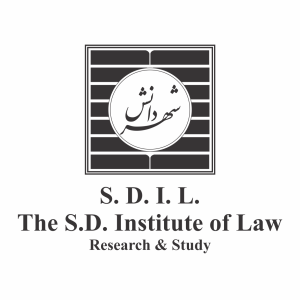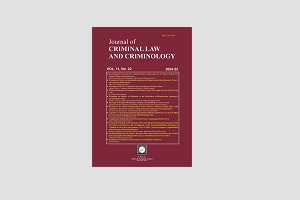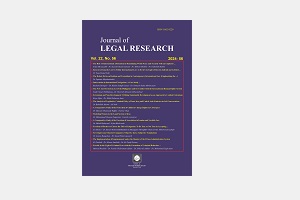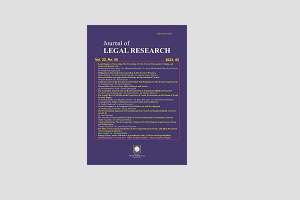Journal of
LEGAL RESEARCH
Number 35
Vol. XVII ● No. 3
Autumn 2018
Managing Editor: Vahid Eshtiagh
Editor-in-Chief: Seyyed Ghasem Zamani
CONTENTS
Articles
Development of Human Rights Generations in Decisions of the International Court of Justice
Hossein Yazdani & Dr. Hossein Al-e-Kajbaf & Dr. Seyed Ghasem Zamani & Dr. Hassan Savari
Transfer of Ownership and Lease of Space Objects in Orbit in the Light of International Space Law
Hosna Khalvandi & Dr. Seyed Hadi Mahmoudi
Relation between the Right to Food and Agricultural World Trade Policy: Cooperation or Confrontation?
Dr. Farhad Talaie & Ali Razmkhah
A Legal-Economic Analysis of Article 21 of the Law Amending the Compulsory Insurance Act: Civil Liability of Motor Vehicle Owners
Dr. Faysal Ameri & Moslem Haj Mohammadi
Transformation of the Meaning of the Theory of Separation of Powers to the Functional Concept
Dr. Mohammad Reza Vijeh & Zohreh Sadat Amiraftabi
Equality and Non-Discrimination in Human Rights System
Ali Saalari
Third-party Protest in Bankruptcy Order from a Judicial Perspective
Dr. Nematolah Hajali & Abouzar Kohnavard
Targeted Killing: Violation of Non-Reciprocity in Fundamental Obligations of Humanitarian Law and Human Rights
Dr. Haleh Hosseini Akbarnezhad & Dr. Hoorieh Hosseini Akbarnezhad
Researcher’s Liability in term of Damages to Environment Associated with Scientific Investigations
Kosar Firouzpour
The Methods for Breaking Negotiating Impasses and Solving Petroleum Conflicts
Dr. Mohamad Alikhani
The Influence of Islamic Jurisprudence in the Formation of Common-Law
Author: Borham Mohammad Ataollah & Translator: Hamzeh Amininasab
Articles
Development of Human Rights Generations in Decisions of the International Court of Justice
Hossein Yazdani
Candidate of Ph.D. of International Law at Tehran PNU, Tehran, Iran
Member of Law Academy
&
Dr. Hossein Al-e-Kajbaf
Associate Professor of Law Faculty of Tehran PNU, Tehran, Iran
&
Dr. Seyed Ghasem Zamani
Associate Professor of Law and Political Science Faculty,
Allameh Tabataba’i University, Tehran, Iran
&
Dr. Hassan Savari
Assistant Professor of Law Faculty of Tarbiat Modares University, Tehran, Iran
Abstract:
Human rights are the most fundamental rights intrinsic to the human nature as a human-being, which many international documents have dealt with it. The Charter of the UN is a very important document which dealt with the human rights form different aspects especially by the International Court of Justice which is one of the principal organs of the UN. Although, in terms of some limits on its jurisdiction, the ICJ can’t deal with human rights disputes, but because of its general jurisdiction the court has referred to human rights law in some of its judgments. During its activities, the ICJ has made important decisions on the issue of human rights which are the fundamental rights and have persistent emphasis on the human dignity.
In this article, we try to study the human rights from the point view of the international court of justice decisions.
Keywords:
Human Rights Generations, International Court of Justice, International Documents, International Law.
Transfer of Ownership and Lease of Space Objects in Orbit in the Light of International Space Law
Hosna Khalvandi
Ph.D. Student of International Law at Islamic Azad University,
South Tehran Branch, Tehran, Iran
&
Dr. Seyed Hadi Mahmoudi
Assistant Professor of Faculty of Law at Shahid Beheshti University, Tehran, Iran
Abstract:
In recent years and in new trends in space industry, transfer of ownership and lease of space objects in orbit, especially satellites, have increased. However, none of the documents in international space law have any reference to the prohibition of the transfer of ownership and the lease of space objects in orbit. Therefore, this article, by accepting the freedom of the transfer of ownership and the lease of space objects in orbit in accordance with the international space law documents such as Outer Space Treaty (1967), Liability Convention (1972), Registration Convention (1975), UN General Assembly Resolutions 59/115 & 62/101, tries to analyze the legal status of Launching State(s) and Transferee State(s) in these processes in terms of international responsibility, international liability and registration of space objects.
Keywords:
Transfer of Ownership, Lease, International Responsibility, Liability, Registration, Appropriate State, Launching State, State of Registry, General Assembly Resolution 59/115 & 62/101.
Relation between the Right to Food and Agricultural World Trade Policy: Cooperation or Confrontation?
Dr. Farhad Talaie
Associate Professor of International Law,
Faculty of Law and Political Science Shiraz University, Shiraz, Iran
&
Ali Razmkhah
M.A. International Law, Legal Advisor, Centre for Sustainable Development (CENESTA), Iran
Abstract:
The Right to Food is one of the most fundamental rights among human rights which its realization has the basic role in achieving of the other human rights. Therefore, the Right to Food is very especial in the context of the international human Rights. Agriculture and the global trade in agricultural products are one of the most important factors affecting food production. Today, much of this trade is done in the framework of the World Trade Organization (WTO) rules. In this context the main question is: to what extent these rules are compatible with the right to food and whether the World trade on agricultural products and the rules governing such trade may have positive or negative effects on the realization of the right to food. This Paper examines the relevant international law documents and analyses the rules and procedure of WTO, and then concludes that trade of the agricultural products in the existing framework of the WTO member states obligation to realize the right to food. Accordingly, this paper suggests that to ensure respect, protection and fulfillment the right to food, a fundamental revision of WTO rules on agricultural products is essential.
Keywords:
The Right to Food, WTO, Agreements on Agriculture, Dumping, Domestic Supports, Subsidies.
A Legal-Economic Analysis of Article 21 of the Law Amending the Compulsory Insurance Act: Civil Liability of Motor Vehicle Owners
Dr. Faysal Ameri
Assistant Professor of Allameh Tabataba’i University, Tehran, Iran
&
Moslem Haj Mohammadi
Master of Economic Law at Allameh Tabataba’i University, Tehran, Iran
Abstract:
Car accidents are the most common and important traffic accidents that courts have been dealing with for the past fifty years. Because of their significance in relation to the liabilities they entail, car accidents have secured a special position in the legal world and have accordingly created their own legal rules. The principal purpose of this Article is to highlight such legal rules and examine the impact which they have on reducing the loss that both the insured and insurer may incur. Our focus of intention in this regard is the insurance policy and the probable risks that would be taken into account for determining the coverage and thereupon the premium that would be paid for future protection.
To this end, Article 21 of the Law Amending the Compulsory Insurance Act, which deals with the civil liability of motor vehicle owners against third parties and the Compensation Fund which has been established thereby are examined. In doing so, we employ the economic analysis approach and as such take into account the price – cost analysis and the aversion risks which for the determination of the latter may be taken into consideration.
In a nutshell, our study demonstrates that by establishing the Compensation Fund for compensating the injured party, the Iranian legislator has adopted an economic approach.
Keywords:
Traffic Accidents, Civil Liability, Article 21 of the Law Amending the Compulsory Insurance Act, the Compensation Fund, Economic Analysis.
Transformation of the Meaning of the Theory of Separation of Powers to the Functional Concept
Dr. Mohammad Reza Vijeh
Chair in Public Law in Allameh Tabataba’i University, Tehran, Iran
&
Zohreh Sadat Amiraftabi
L.L.M in Public Law from Faculty of Law of Allameh Tabataba’i, Tehran, Iran
Abstract:
As one of the existing theories of the constitutional law, the separation of power is facing great challenges and lack of functionality in its application, to the extent that some of the radical opponents of this theory consider it obsolete.
The present article aims at transforming this view, by way of providing a modern approach to this theory, and attempts to put forward a method for facing such challenges. Rather than the formal separation of power, this article concentrates on the functional separation, which is a new approach to the separation of power.
This approach, concentrates on separation of power functions, rather than power structures, whereby dealing with challenges in the separation of power.
Keywords:
The Functional Separation of Powers, The Classic Separation of Powers, The Politics-Administration Dichotomy, Supervision on Triple Branches, The Independent Governmental Institutions.
Equality and Non-Discrimination in Human Rights System
Ali Saalari
Master of Arts in Human Rights, Allameh Tabataba’i University, Tehran, Iran
Abstract:
Human dignity is the central idea of human rights. Also, Equality of human beings rooted in inherent dignity. With understanding of these conceptions, we recognize autonomy of human and his individual and collective right to self-determination; and reject all forms of discrimination and degrading treatment. Thus equality and elimination of unjustifiable discriminations are purposes of human rights. But still there are some questions. How equality works? What is the influence of equality on society? And it is so important that how can we achieve equality? Scholars answer these questions from different perspectives. They have confirmed is not sufficient to recognize equality; and have offered some ways for promote and reinforcement of equality. In short, the realization of the real equality is required to campaign against discrimination, equal concern and respect for all citizens by states, and compensation measures to help disadvantaged individuals and groups in community.
Keywords:
Equality, Non-Discrimination, Human Rights, Substantive Equality.
Third-party Protest in Bankruptcy Order from a Judicial Perspective
Dr. Nematolah Hajali
Ph.D. in Private Law from the Judiciary Research Institute
and Supreme Court Prosecutor of the Supreme Court, Iran
&
Abouzar Kohnavard
Ph.D. Candidate of Criminal Law and Crime of Urmia University, West Azerbaijan, Iran
Abstract:
The T-law, in Article 536 of the Commercial Code, considers the bankruptcy order, as well as the decree on the date when the bankrupt has ceased to be bankrupt, on the date of the issuance of the warrant, within the prescribed. By specifying the declaration of bankruptcy in Article 537 of that law, The judicial procedure, also on the basis of the declarative character and the final clause of Article 538 of this law, on the definitive and non-objectionable nature of the bankruptcy judgment after The third party’s objection to such sentences is to waive the provisions of Articles 417 to 425 of the Civil Procedure Law and is uncontested. Although, in some cases, courts of third-party protest accept a bankruptcy order and, in the case of objectionable reasons, violate the vote. Nevertheless, due to the quality of the proceedings and the issuance of a bankruptcy order, it can be argued that the third party’s protest is subject to bankruptcy; however, it is possible within the time limits set forth in Article 537 of the Commercial Code.
Keywords:
Third Party Proceedings, Bankruptcy, Judicial Procedure, Declarations, Absolute Verdict.
Targeted Killing: Violation of Non-Reciprocity in Fundamental Obligations of Humanitarian Law and Human Rights
Dr. Haleh Hosseini Akbarnezhad
Lecturer at University
&
Dr. Hoorieh Hosseini Akbarnezhad
Assistance Professor of Tarbiat Modares University, Tehran, Iran
Abstract:
The practice of targeting some persons and killing them has been criticized in recent years in the international community. Now targeted killing is defined as the use of lethal force attributable to a subject of international law with the intent, premeditation and deliberation to kill individually selected persons who are not in the physical custody of those targeting them and recognized as a clear violation of international human rights and international humanitarian law. It violates some fundamental rights of human beings such right to life and right to fair trial. Some basic rules of humanitarian law are also in conflict with this policy, for example it opposes the obligation of state for protection of civilians in armed conflicts and violates the principle of proportionality. UN human rights experts challenge targeted killing policies and consider it in relation to extrajudicial, summary or arbitrary Executions. Therefore non-Justiciability of the policy of targeted killing is reaffirmed in humanitarian law and human rights.
Keywords:
Targeted Killing, Humanitarian Law, Human Rights, Right to Life.
Researcher’s Liability in term of Damages to Environment Associated with Scientific Investigations
Kosar Firouzpour
Ph.D. Candidate at University of Tehran, Tehran, Iran
Abstract:
Right to environment and right to research are both belong to human rights, which must be preserved. The individual’s right to enjoy a healthy environment is a part of the human rights which it has been increasingly threatened with human activities. This right is not only a part of outstanding proofs for solidarity right, but it’s also a requisite for certainty of many human rights. Obtaining this right requires a level of development which may cause more damages to environment itself. Therefore, researcher’s activities in course of progression and development might be prejudicial to environment. This article discusses the condition in which the researcher causes damage to environment while conducting scientific investigations and the necessity of compensation is in contradiction with the researcher’s right to scientific investigations. Thus, the article suggests a compensation policy which preserves both rights simultaneously. According to principle 21 of Stockholm Declaration of Human Environment and the principle 2 of Rio Declaration on Environment and Development, the activities under government’s jurisdiction are obligated not to damage environment. Therefore, the government has key role to serve for solving the [discussed] contradiction, improving scientific investigations in a way they cause less damages [to environment] and preventing environmental damages.
The current study aims to investigate the fundamentals of human right to environment and human right to research for solving this contradiction and to investigate the related legal approaches in Iran towards this subject.
Keywords:
Right to Environment, Right to Research, Civil Responsibilities, Iran Laws.
The Methods for Breaking Negotiating Impasses and Solving Petroleum Conflicts
Dr. Mohamad Alikhani
Ph.D. in Oil and Gas Law from Shahid Beheshti University, Tehran
and LL.M. from University of Aberdeen, UK
Abstract:
It is inevitable for the national oil companies and International oil companies to negotiate and reach agreements for accomplishing the supposed projects. To avoid the possible conflicts, the negotiation methods are the most appropriate ways which can be used in different contractual phases including prior to the conclusion of the contract, at the time of drafting and incorporating the terms into the agreement and at the time of performances of the contract. There are, however, a wide range of positions which can be taken by the parties during negotiation process that impede the parties to reach their agreement. Determining goals and considering variant alternatives, taking proper strategies suitable for the subject of the negotiation, incorporating appropriate terms in dispute resolution section, renegotiating disputed matters and managing the conflicts at the time of performance of the contract can assist the parties in breaking impasses during negotiation phases.
Keywords:
Negotiation, Breaking Impasses, Negotiating Strategies, Renegotiation, Management of Contractual Conflicts.
The Influence of Islamic Jurisprudence in the Formation of Common-Law
Author:
Borham Mohammad Ataollah
Professor at the University of Alexandria, Egypt
Translator:
Hamzeh Amininasab
Ph.D. Student in Private Law, The University of Qom, Qom, Iran
Abstract:
There are a lot of similarities between some common-law rules and Islamic jurisprudence. The survey of these rules in the light of Islamic jurisprudence, reveals the relationship between the two systems and shows that the emergence of these rules is the result of impact of common-law from Islamic jurisprudence rules. In this study, the historical circumstances and backgrounds of this influence and its scope in various issues investigated
Keywords:
Islamic Jurisprudence, Common-Law, Legal System, Comparative Law.





